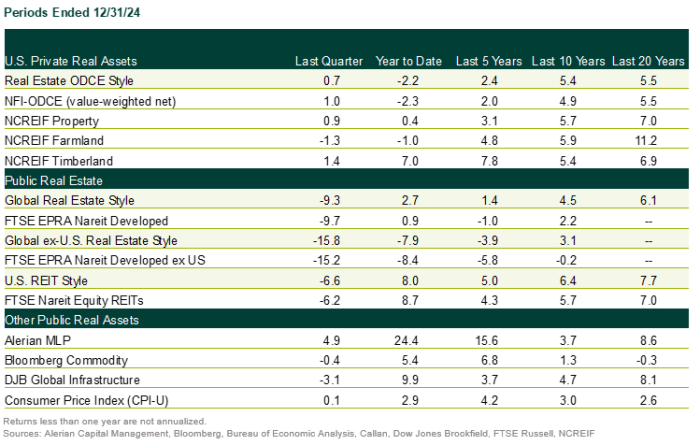Listen to This Blog Post
Private real estate valuations appear to have bottomed and now reflect higher borrowing costs. Income returns were positive across most sectors and regions.
REITs fell during 4Q24 and underperformed equities, both in the U.S. and globally. Global REITs are trading at a discount to net asset value (NAV).
4Q24 real estate performance summary
Private real estate | The NCREIF Property Index, a measure of U.S. institutional real estate assets, rose 0.9% during 4Q24. The income return was 1.2% while the appreciation return was –0.3%.
Retail led property sector performance with a gain of 1.9%. Office finished last with a loss of 0.7%.
Regionally, the Midwest led with a gain of 1.5%, while the West was the worst performer with a gain of just 0.4%.
The NCREIF Open-End Diversified Core Equity (ODCE) Index, representing equity ownership positions in U.S. core real estate, rose 1.0% during 4Q.

Redemption queues | ODCE redemption queues average 16.4% of NAV, with a median queue of 13.4%. This compares to the Global Financial Crisis, when queues peaked at approximately 15% of NAV. Outstanding redemption requests for most large ODCE funds are approximately 6% to 33% of NAV (with one outlier at 56%).
Redemption queues are now sharply decreasing after having peaked at 19.3% of NAV in 1Q24. This has been driven primarily by rescissions of redemption requests within a handful of managers with large queues. In certain cases, this has been due to loyalty fee programs being instituted.
Transactions | Transaction volume is increasing on a rolling four-quarter basis yet remains below five-year averages. In 4Q24, transaction volume increased on a quarter-over-quarter basis. Volume remains lower compared to 2022.
The volatile rise in interest rates is the driving force behind the slowdown in transactions. Increasing transactions are driven by increasing confidence in multi-family and industrial values. Valuations have largely adjusted to increased borrowing costs.
REITs | U.S. REITs (-6.2%) underperformed the S&P 500 (2.4%). The underperformance in U.S. REITs was driven by hawkish rate cuts as well as lower projected rate cuts in 2025.
Cyclical sectors like Retail, Lodging, and Office outperformed, while Data Centers remained strong, reflecting the recent resilience of tech stocks. Conversely, Self-storage was the weakest performer, as expectations of smaller rate cuts reduced the appeal of homeownership, thereby limiting demand for storage.
The FTSE EPRA Nareit Developed Asia Index (USD) lost 13.5% during the quarter. Japan and Hong Kong outperformed. The weaker yen provided relative support to Japan-oriented equities, including Japanese developers. Hong Kong benefited from renewed expectations of Chinese stimulus. Meanwhile, Australia was the main underperformer, as the Reserve Bank of Australia (RBA) kept rates unchanged during the quarter despite persistent inflation, though with a notably dovish tone.
The FTSE EPRA Nareit Developed Europe Index (USD) plunged by 18.0% during the quarter. Europe was the weakest performer, pressured by a combination of deteriorating growth expectations due to tariffs and rising bond yields, which followed the U.S. upward trend. The U.K. lagged behind the rest of Europe, weighed down by stronger-than-expected inflation and sluggish growth, as investors grew concerned about potential tax hikes from the budget. In contrast, Switzerland’s defensive market proved the most resilient, with rate-sensitive sectors benefiting from a larger-than-anticipated rate cut by the Swiss central bank. Among sectors, retail property stocks were among the strongest, supported by signs of improving demand.

Disclosures
The Callan Institute (the “Institute”) is, and will be, the sole owner and copyright holder of all material prepared or developed by the Institute. No party has the right to reproduce, revise, resell, disseminate externally, disseminate to any affiliate firms, or post on internal websites any part of any material prepared or developed by the Institute, without the Institute’s permission. Institute clients only have the right to utilize such material internally in their business.


